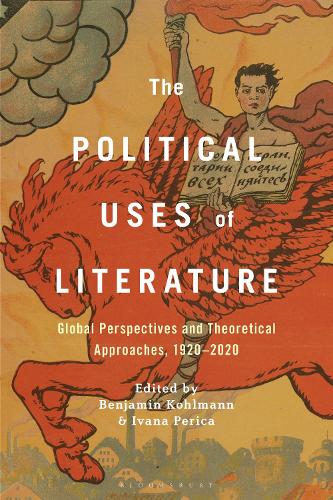
The Political Uses of Literature: Global Perspectives and Theoretical Approaches, 1920-2020
(Paperback)
Available Formats
Publishing Details
The Political Uses of Literature: Global Perspectives and Theoretical Approaches, 1920-2020
By (Author) Prof. or Dr. Benjamin Kohlmann
Edited by Dr. Ivana Perica
Bloomsbury Publishing PLC
Bloomsbury Academic USA
24th July 2025
United States
Classifications
Professional and Scholarly
Non Fiction
Literary theory
Literary studies: c 1900 to c 2000
Comparative politics
809.933581
Physical Properties
Paperback
312
Width 152mm, Height 229mm
Description
Drawing on a global history of politicized writing, this book explores literatures utility as a mode of activism and aesthetic engagement with the political challenges of the current moment. The question of literatures uses has recently become a key topic of academic and public debate. Paradoxically, however, these conversations often tend to bypass the rich history of engagements with literatures distinctly political uses that form such a powerful current of 20th- and 21st-century artistic production and critical-theoretical reflection. The Political Uses of Literature reopens discussion of literatures political and activist genealogies along several interrelated lines: As a foundational moment, it draws attention to the important body of interwar politicized literature and to debates about literatures ability to intervene in social reality. It then traces the mobilization of related conversations and artistic practices across several historical conjunctures, most notably the committed literature of the 1960s and our own present. In mapping out these geographically and artistically diverse traditions including case studies from the Americas, Europe, Africa, India and Russia contributors advance critical discussions in the field, making questions pertaining to politicized art newly compelling to a broader and more diverse readership. Most importantly, this volume insists on the need to think about literatures political uses today at a time when it has become increasingly difficult to imagine any kind of political efficacy for art, even as the need to do so is growing more and more acute. Literature may not proffer easy answers to our political problems, but as this collection suggests, the writing of the 20th century holds out aesthetic resources for a renewed engagement with the dilemmas that face us now.
Reviews
An absorbing, richly textured, and innovative study that engages a welcome range of voices and geographical sites. The Political Uses of Literature opens new perspectives on literature and activism of the past 100 years, sensitively illuminating the local specificities and shifting historical conjunctures shaping the purposes to which politicized art has been put in transnational movements and theoretical conversations. * Nicole Simek, Cushing Eells Professor of Philosophy and Literature, Whitman College, USA *
This is a timely and necessary book that presents a compelling case for re-establishing political purpose as central to artistic production. The breadth of its focus marks it out as a landmark contribution to the comparative analysis of international political writing. * Nick Hubble, Professor of Modern and Contemporary English, Brunel University London, *
Kohlmann and Pericas edition offers a most welcome resource, in one volume, shoring up the contemporary in relation to prior understandings of the 'political uses' of literature. Portable, and providing expert (suitably targeted) coverage, The Political Uses of Literature leads its emerging field by virtue of effective consolidation. * Stuart Christie, Professor of English Language and Literature, Hong Kong Baptist University, China *
Author Bio
Benjamin Kohlmann is Professor of English at Regensburg University, Germany, and author of Committed Styles: Modernism Politics and Left-Wing Literature (2014) and British Literature and the Life of Institutions: Speculative States (2021). His co-edited volumes include A History of 1930s British Literature (2019; TLS Books of the Year). Ivana Perica is Marie Jahoda Scholar at the University of Vienna, Austria, and author of Die privat-ffentliche Achse des Politischen: Das Unvernehmen zwischen Hannah Arendt und Jacques Rancire (2016).
